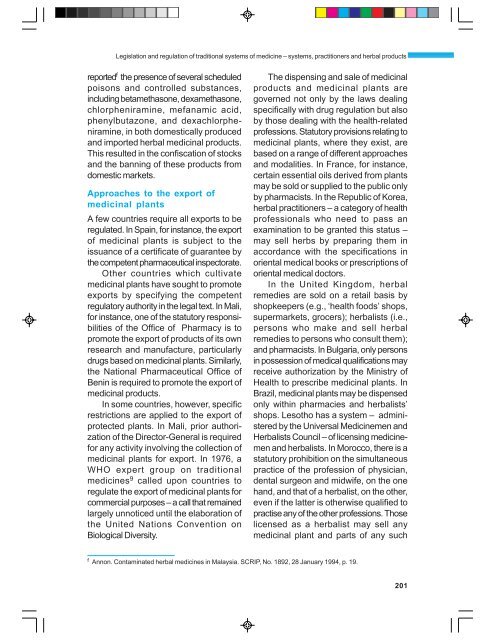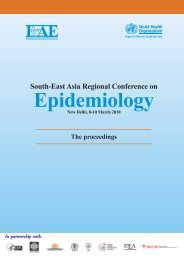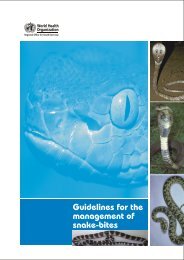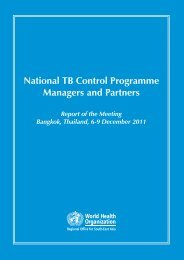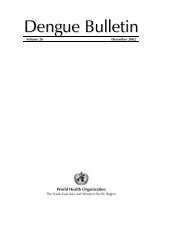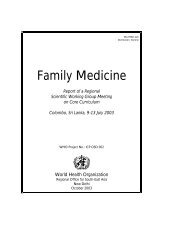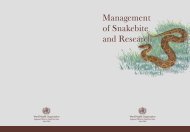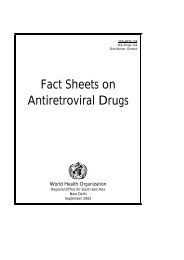Traditional Medicine in Asia
Traditional Medicine in Asia
Traditional Medicine in Asia
Create successful ePaper yourself
Turn your PDF publications into a flip-book with our unique Google optimized e-Paper software.
Legislation and regulation of traditional systems of medic<strong>in</strong>e – systems, practitioners and herbal products<br />
reported f the presence of several scheduled<br />
poisons and controlled substances,<br />
<strong>in</strong>clud<strong>in</strong>g betamethasone, dexamethasone,<br />
chlorpheniram<strong>in</strong>e, mefanamic acid,<br />
phenylbutazone, and dexachlorpheniram<strong>in</strong>e,<br />
<strong>in</strong> both domestically produced<br />
and imported herbal medic<strong>in</strong>al products.<br />
This resulted <strong>in</strong> the confiscation of stocks<br />
and the bann<strong>in</strong>g of these products from<br />
domestic markets.<br />
Approaches to the export of<br />
medic<strong>in</strong>al plants<br />
A few countries require all exports to be<br />
regulated. In Spa<strong>in</strong>, for <strong>in</strong>stance, the export<br />
of medic<strong>in</strong>al plants is subject to the<br />
issuance of a certificate of guarantee by<br />
the competent pharmaceutical <strong>in</strong>spectorate.<br />
Other countries which cultivate<br />
medic<strong>in</strong>al plants have sought to promote<br />
exports by specify<strong>in</strong>g the competent<br />
regulatory authority <strong>in</strong> the legal text. In Mali,<br />
for <strong>in</strong>stance, one of the statutory responsibilities<br />
of the Office of Pharmacy is to<br />
promote the export of products of its own<br />
research and manufacture, particularly<br />
drugs based on medic<strong>in</strong>al plants. Similarly,<br />
the National Pharmaceutical Office of<br />
Ben<strong>in</strong> is required to promote the export of<br />
medic<strong>in</strong>al products.<br />
In some countries, however, specific<br />
restrictions are applied to the export of<br />
protected plants. In Mali, prior authorization<br />
of the Director-General is required<br />
for any activity <strong>in</strong>volv<strong>in</strong>g the collection of<br />
medic<strong>in</strong>al plants for export. In 1976, a<br />
WHO expert group on traditional<br />
medic<strong>in</strong>es9 called upon countries to<br />
regulate the export of medic<strong>in</strong>al plants for<br />
commercial purposes – a call that rema<strong>in</strong>ed<br />
largely unnoticed until the elaboration of<br />
the United Nations Convention on<br />
Biological Diversity.<br />
The dispens<strong>in</strong>g and sale of medic<strong>in</strong>al<br />
products and medic<strong>in</strong>al plants are<br />
governed not only by the laws deal<strong>in</strong>g<br />
specifically with drug regulation but also<br />
by those deal<strong>in</strong>g with the health-related<br />
professions. Statutory provisions relat<strong>in</strong>g to<br />
medic<strong>in</strong>al plants, where they exist, are<br />
based on a range of different approaches<br />
and modalities. In France, for <strong>in</strong>stance,<br />
certa<strong>in</strong> essential oils derived from plants<br />
may be sold or supplied to the public only<br />
by pharmacists. In the Republic of Korea,<br />
herbal practitioners – a category of health<br />
professionals who need to pass an<br />
exam<strong>in</strong>ation to be granted this status –<br />
may sell herbs by prepar<strong>in</strong>g them <strong>in</strong><br />
accordance with the specifications <strong>in</strong><br />
oriental medical books or prescriptions of<br />
oriental medical doctors.<br />
In the United K<strong>in</strong>gdom, herbal<br />
remedies are sold on a retail basis by<br />
shopkeepers (e.g., ‘health foods’ shops,<br />
supermarkets, grocers); herbalists (i.e.,<br />
persons who make and sell herbal<br />
remedies to persons who consult them);<br />
and pharmacists. In Bulgaria, only persons<br />
<strong>in</strong> possession of medical qualifications may<br />
receive authorization by the M<strong>in</strong>istry of<br />
Health to prescribe medic<strong>in</strong>al plants. In<br />
Brazil, medic<strong>in</strong>al plants may be dispensed<br />
only with<strong>in</strong> pharmacies and herbalists’<br />
shops. Lesotho has a system – adm<strong>in</strong>istered<br />
by the Universal <strong>Medic<strong>in</strong>e</strong>men and<br />
Herbalists Council – of licens<strong>in</strong>g medic<strong>in</strong>emen<br />
and herbalists. In Morocco, there is a<br />
statutory prohibition on the simultaneous<br />
practice of the profession of physician,<br />
dental surgeon and midwife, on the one<br />
hand, and that of a herbalist, on the other,<br />
even if the latter is otherwise qualified to<br />
practise any of the other professions. Those<br />
licensed as a herbalist may sell any<br />
medic<strong>in</strong>al plant and parts of any such<br />
f Annon. Contam<strong>in</strong>ated herbal medic<strong>in</strong>es <strong>in</strong> Malaysia. SCRIP, No. 1892, 28 January 1994, p. 19.<br />
201


